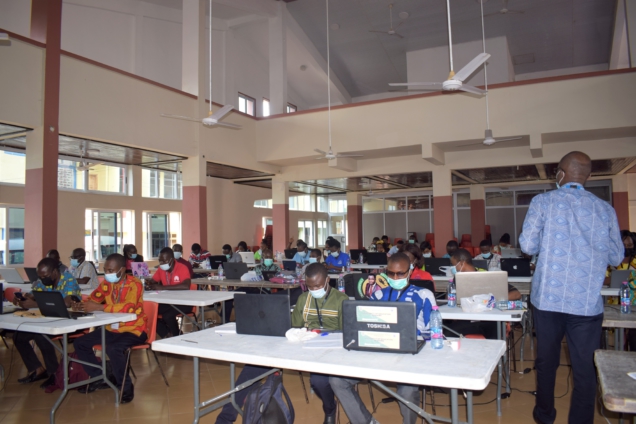Fifty teachers from the Ashanti Region have been equipped with digital tools to meet the educational demands of the 21st century.
The teachers from 43 districts, were trained in Emergency Remote Training which aims at improving learning outcomes.
The Teachers were trained using the 11 training modules from the UNESCO ICT Essential for Teachers.
About 9.2 million students from Kindergarten to Senior High School and 450,000 teachers were affected by the closure of schools as a result of Covid-19.
In view of this, UNESCO-Korean Funds-in-Trust is however providing Emergency Remote Teaching training to both pre-and in-service teachers.
This is in line with Sustainable Development Goal 4, the projects seek to ensure inclusive and equal quality education through ICT.
The Emergency Remote Teaching will help teachers implement strategies to teach online using low-tech technologies in remote areas.
According to the General Secretary of the Ghana National Association of Teachers, Thomas Musah, 200 teachers in Ghana will benefit from the emergency remote teaching techniques project.
“Covid has taught us that education cannot wait,” he said. “The face-to-face way of teaching is gradually giving way to digital and online teaching. Distance should not be a barrier for teaching and learning”.
“UNESCO through the Korean government has been implementing this project in other African countries prior to the advent of Covid basically to leverage ICT to be able to teach effectively,” said Eric Balangtaa, National Associate Project Officer UNESCO-Ghana," he added.
Ashanti Regional Coordinator of Basic and Second-cycle schools Juliet Agyemang Duah also lauded UNESCO-Korean Funds-in-Trust and other agencies for the training.
“If teachers had knowledge of digital training most of the teachers would have taught their students via the internet during the Covid-19 pandemic but we had no idea about digital teaching.
“GES had to spend a lot campaigning around to get students back to school from post COVID.
“We’re grateful to UNESCO and all the agencies that made this training possible,” she emphasized.
Participants were presented with certificates by the Ministry of Education and UNESCO field Office in Accra.
The Center for National Distance Learning and Open Schooling (CENDLOS), National Council for Curriculum and Assessment (NaCCA), Ghana Tertiary Education Commission (GTEC), National Teaching Council (NTC) and Ghana Education Service (GES) are implementing partners.
Latest Stories
-
Nestlé Supplier Day 2025: Fostering collaboration for sustainable growth
14 minutes -
Don’t risk progress with new reforms – IERPP cautions BoG
34 minutes -
Planting for the Future: Forest clubs and tree planting drive to combat environmental damage
49 minutes -
Over-concentration of resources in urban centres stifling national economic progress – Nii Moi Thompson
1 hour -
It’s time gov’t heeds our call – GRNMA urges swift action amid worsening health crisis
1 hour -
Atwima Nwabiagya South MCE takes steps to reclaim degraded lands through tree planting
1 hour -
NLC secures high court injunction to end nurses’ strike
2 hours -
$30 million road scandal: Minister goes after Indian contractor
2 hours -
WaterAid Ghana, Guinness Ghana commission major water expansion projects in Nadowli and Nandom
2 hours -
“We Are Coming”: Womba Africa to share Ghana’s cultural spirit in UK tour
2 hours -
1,200 excavators await clearance at Tema Port; close to 3,000 more headed to Ghana – Transport Minister reveals
2 hours -
We receive over 200 excavators daily – Transport Minister raises alarm over influx at Tema Port
2 hours -
Health Minister appeals to striking nurses and midwives to return to work
2 hours -
Hannah Bissiw recounts ‘hostage-style’ attack following illegal mining raid at Bui Sobinso
2 hours -
EU scientists warn against using foreign carbon credits to meet climate targets
2 hours

